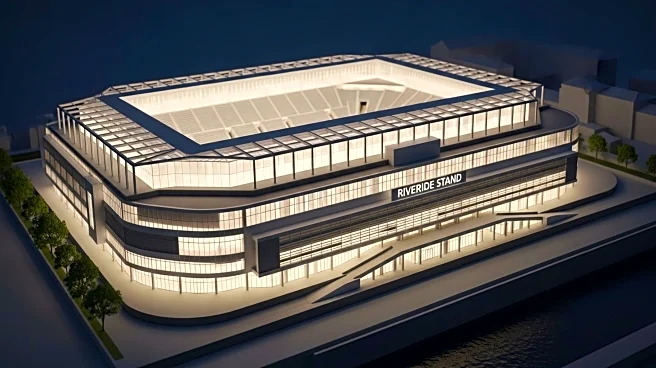What's Happening?
Fulham FC has unveiled its new Riverside Stand at Craven Cottage, a historic soccer stadium in West London. The stand, which cost approximately $134.5 million, was designed to function as a hotel and entertainment venue, rather than solely a sports stadium. The six-story structure includes a food hall, restaurant, conference and performance spaces, a members' club, and a top-floor hotel and spa. The Riverside Stand increases the stadium's capacity by 3,000 seats, raising the premium seating percentage from 1.5% to 10%. This development is expected to significantly boost Fulham's commercial revenue. The stand also features a new public walkway along the River Thames, enhancing community access and engagement.
Why It's Important?
The Riverside Stand represents a shift in how sports venues can generate revenue beyond match days. By prioritizing non-match-day business, Fulham FC aims to increase its financial stability amidst tightening Premier League profit and sustainability rules. The stand's design allows it to serve as a community hub, attracting visitors year-round and contributing to local economic activity. This approach could serve as a model for other sports clubs seeking to diversify their revenue streams and enhance community relations. The development also highlights the growing trend of integrating sports venues with hospitality and entertainment facilities.
What's Next?
As the Riverside Stand enters its first full season of operation, Fulham FC will monitor its impact on revenue and community engagement. The club's financial results, expected in 2026, will reveal the stand's contribution to overall earnings. Other Premier League clubs may look to Fulham's model as they explore ways to maximize their stadiums' potential. Additionally, the Riverside Stand's success could influence similar projects, such as the Jacksonville Jaguars' stadium renovation, as sports teams increasingly seek innovative solutions to enhance profitability and fan experience.
Beyond the Headlines
The Riverside Stand's development underscores the importance of strategic planning in sports venue design. By focusing on non-match-day usage, Fulham FC has created a versatile space that serves both the club and the community. This approach challenges traditional stadium design, which often prioritizes match-day activities. The integration of hospitality and entertainment facilities within sports venues may lead to broader changes in how clubs interact with their local communities, fostering stronger ties and mutual benefits.











